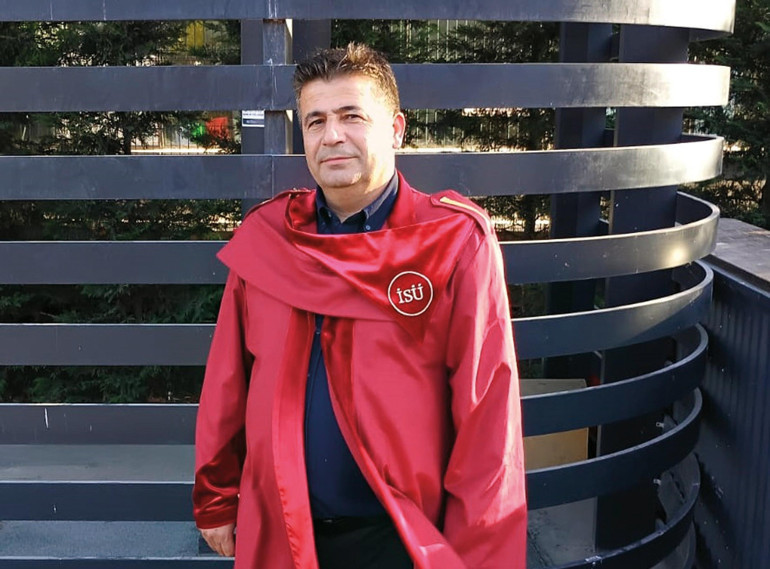Jobs of the future have entered schools

Developing technology continues to rapidly transform nearly every sector, creating numerous new job opportunities. The need for specialized professionals in previously unheard-of fields is increasing. In recent years, educational institutions have begun to adapt to this rapid transformation, offering more departments dedicated to what are being described as the "professions of the future." Artificial intelligence, of course, leads the way. However, many other professions, such as robotic agriculture, digital game design, cybersecurity, and back-end software, are also being taught in schools.
We've compiled a list of the new-generation departments that Turkish universities have opened for the first time this year. We've gathered information about the new departments from many universities, including Medipol University, İstinye University, Acıbadem University, Haliç University, and Istanbul Aydın University. Here are the departments that have emerged at universities in the last few years and offer significant job potential in the future:
Digital Game Design: The program aims to cultivate graduates who are equipped to meet the needs of the rapidly growing and globally recognized gaming industry. The program aims to cultivate creative and innovative individuals in line with its vision of digital transformation and qualified human resources. With its interdisciplinary structure, the department combines diverse fields such as game design, software technologies, art, storytelling, and interactive media, focusing on developing students' technical skills and creative thinking. Furthermore, through integration with the entrepreneurial ecosystem, the program aims to develop students not only as game designers but also as individuals who will shape industries focused on digital transformation within a cross-sectoral context.

Artificial Intelligence Engineering: The English-language Artificial Intelligence Engineering Program at Istanbul Medipol University's Faculty of Engineering and Natural Sciences stands out as a profession of today and the future. The program offers students comprehensive and advanced training in fields such as artificial intelligence, machine learning, data science, and algorithm development. The university trains its students in line with the Industry 5.0 vision, equipping them with the skills to lead in the technological world.
Back-end Software Development: The Back-end Software Development program, available in English, provides students with strong skills in software development, database management, system architecture, and server-side application design. Graduates can become sought-after software professionals in the IT industry.
Robotics and Artificial Intelligence: The Robotics and Artificial Intelligence program, also taught in English, provides students with advanced knowledge and skills in smart systems, robotics, and artificial intelligence applications. The program is supported by hands-on laboratory work and offers graduates a wide range of job opportunities in the technology sector.
Cybersecurity: Equipping students to address the increasing security threats in the digital world, the program provides an understanding of emerging vulnerabilities and threats in information systems, including network security, computer security, software security, and computer network security. It also informs students about the necessary precautions to counter these threats and aims to foster their development.
Software Development: The software development undergraduate program offers a comprehensive curriculum covering programming languages, algorithms, data structures, database management, web and mobile development, software engineering, artificial intelligence, cloud computing, and cybersecurity. The program emphasizes hands-on learning approaches, including laboratory-based courses, capstone projects, and utilizing real-world software development environments. Collaborations with technology companies offer opportunities such as internships, mentorship programs, and guest lectures. Students are taught using cutting-edge technologies like blockchain, the Internet of Things (IoT), and artificial intelligence (AI), ensuring they are at the forefront of technological advancements.
Precision agriculture and agricultural robots: The program aims to develop students into competent individuals in both basic sciences and advanced engineering and agricultural technologies. In the first years of the program, students gain a solid scientific foundation through core courses such as mathematics, physics, chemistry, biology, and computer science. Building on this foundation, advanced courses equip them with classical agricultural knowledge such as field and horticultural crops, soil science, plant protection, and zootechnics. The department also offers courses in fundamental engineering fields such as mechanics and fluid dynamics, as well as agricultural mechanization and automation systems. Students can gain the digital competencies required by the age through courses covering advanced technologies such as artificial intelligence, machine learning, image processing, the Internet of Things (IoT), unmanned aerial vehicles (UAVs), and autonomous systems, which have become indispensable components of today's agriculture.

Dr. Lecturer Fuat Candan
'SOFTWARE HAS BECOME A FORCE THAT TRANSFORMS THE WORLD'
Sharing his views on new-generation departments and software development, Dr. Fuat Candan, Head of the Software Development Department at İstinye University, said, “Software is not just a profession ; it has become a force shaping the future, giving it meaning, and transforming the world. In this department, students learn fundamental topics such as modern programming languages, algorithms, and data structures, and can specialize in areas such as artificial intelligence, big data analytics, cybersecurity, web-based systems, mobile applications, and desktop applications. Graduates of the Software Development Department can work as software developers, software testers, and software consultants in companies' IT departments, IT and software companies located in technoparks, and international IT firms. They can also pursue careers as project managers, consultants, or entrepreneurs in a wide range of sectors, from banking and healthcare to education and e-commerce. We aim to cultivate individuals who not only write code, but also think, design, and produce.”
THESE PROFESSIONS WILL BE FAVORITE
While the predictions of organizations such as the World Economic Forum, McKinsey, and PwC indicate that the transformation in professions will be inevitable starting from 2050, they list the most popular professions of the future as follows:
Technology and artificial intelligence
- Artificial intelligence specialist (AI specialist)
- Machine learning engineer
- Data scientist / data analyst
- Cyber security expert
- Robotics engineer
- Autonomous vehicle technologies engineer
- Blockchain developer
- Augmented reality (AR) and virtual reality (VR) designer
Sustainability and energy
- Renewable energy engineer
- Energy storage and battery technology expert
- Carbon footprint auditor
- Climate change analyst
- Sustainable agriculture expert
Health and biotechnology
- Bioinformatics expert
- Genetic counselor
- Personalized medicine specialist
- Elderly care technology specialist
- Remote health services (telemedicine) doctor/technician
Creativity and media
- Digital content producer (influencer, podcast, YouTube, social media content)
- Game designer and developer
- Metaverse architect
- Experience designer (UX/UI)
Business world and new areas
- E-commerce and digital marketing expert
- Artificial intelligence ethicist
- Remote working consultant
- Lifelong learning coach
- Fintech expert
hurriyet





